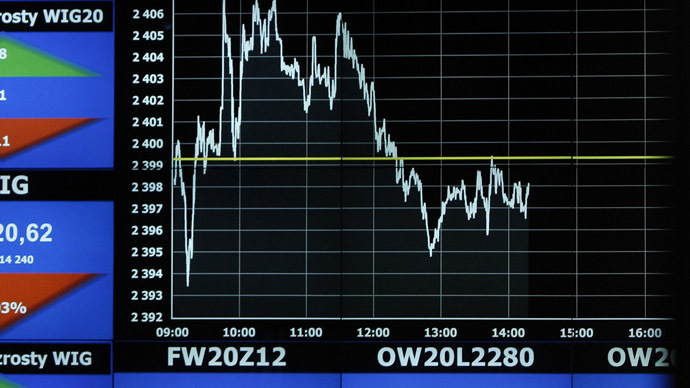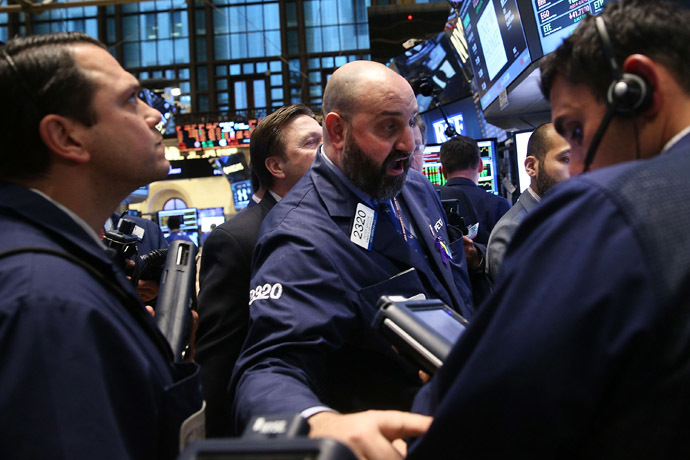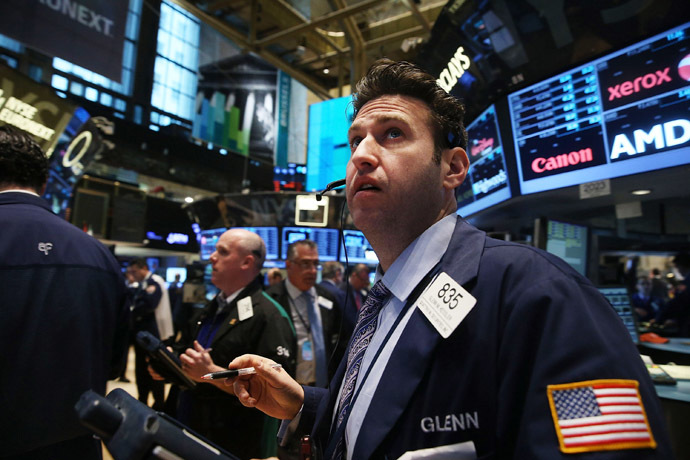Financial crisis for many, bonanza for the few

Despite what the UK's ruling politicians or statisticians from palm-greased think tanks may say, the UK’s economic “recovery” is visible nowhere on the country’s streets.
The opiate of Quantitative Easing (QE) or Printing Money, the £375 billion fraudulently spirited up so far, is making some of the figures look good, but it is killing the patient.
The effect of QE is to propel the nest eggs of the rich from prudent “savings accounts,” where interest rates are at an all-time low, into capricious stock and bond markets to be managed by hedge funds and other pushy players. Meanwhile, everything with half a brain that moves, including the Parliamentary Commission on Banking, chaired by Conservative MP Andrew Tyrie, is demanding to see clear blue water between public-facing banks and the casino economy. However, precisely the opposite is happening, as billions of savings leaves the safe ground in search of higher returns.
The London media have no excuse to talk of a “recovery.” They don't have to look very far to see the tell-tale signs of a nation falling apart: Try looking down next time you're in the street. None of the infrastructure of the nation is being maintained. From jutting-out high street paving slabs to potholed roads and even silted up rivers in the Somerset Levels that have been flooded since Christmas, the vital systems of the nation are clogged and breaking.
For a country with one of the highest living standards in the world to have 20 percent of its population, ticking up every month, existing below the poverty line, something must be very wrong. And the “democratic” strings that are supposed to tie Britain's 65 million people to the cosseted elite that spend the nation's taxes are also horribly frayed. The period before a general election is when a government courts its voters.
And what is the role of Britain's third party in all this? The Liberal Democrats (with 56 MPs) hold the balance of power between Labour (256) and the Conservatives (303). Any party in such a position should call the shots, as Irish MPs did with the 1885 Ashbourne Act which forced absentee English landowners to hand over land to Irish farmers who had been impoverished by the famine: A dramatic change in ownership that was one of the main catalysts for Irish Home Rule.
A broken labour market
Like the “Balance of Payments,” which compares British exports to imports, taking stock of the “Cost of Living” has fallen out of fashion in the London media. Maybe it's the lack of the feel-good factor in both sets of statistics – but that doesn't make either of them any less crucial to understanding whether or not the economy is working. Cost of living is rarely mentioned because an enormous, economically driven, social engineering by the power elite has been played out in our lives in a generation. Britain has fallen from a high-wage, unionized, high-job security economy, from a developed world to a third-world economy in those 30 years.

A broken housing market
Former Conservative Party leader Iain Duncan Smith (IDS) has a “great plan” to exterminate Britain's welfare benefits. So as Work and Pensions Secretary he has put the onus on the claimant, however disabled, mentally ill or otherwise infirm, to prove they are in need, and many are struggling to do so. Scores have already taken their own lives because the vulnerable cannot endure his “survival of the fittest” ATOS test. Duncan-Smith's own family, though, continue to receive around £1.2 million in annual welfare benefits – in the form of agricultural subsidies for their inherited land.
IDS's other “flagship” policy is the Bedroom Tax. So vicious is this tax that it puts the most vulnerable in constant fear of eviction and, unbelievably, costs the government more! Both to pay the higher rents the private sector demands and in eviction fees. Meanwhile, Britain is encouraging mass economic migration and building fewer homes than any time since the 1920s, so as to keep property prices artificially high. Now Britons who don't get Housing Benefit are, on average, paying a staggering 45 percent of their income on rent or mortgage costs.
A broken food market
The international grain trade, according to Oxfam, is now dominated by only five multinational companies. ADM, Bunge, Cargill, Glencore and Louis Dreyfus control 90 percent of this fundamental trade. Through the unregulated derivative markets' ability to speculate on a future collapse in world food supplies, a hideous profit motive is being whispered of which enriches the few by pushing billions of people to the edge of starvation.
With the demise of the biggest traditional fish, meat and fruit and vegetable markets, deals are now cut behind closed doors for vast quantities of food, the economies of scale suiting buyer and seller alike. With only seven supermarket chains in the UK (Aldi, Asda, Lidl, Morrison's, Sainsbury's, Tesco and Waitrose) selling 85 percent of the country’s food they are able to coax almost every consumer with other basic essentials on the same site: petrol, banking and pharmacies, for example, driving traditional, locally-owned shops to the wall.
As historian E.P. Thompson wrote in his 1979 book, “Writing by Candlelight,” quoting from an Elizabethan diary he found behind an oak panel in his library:
Fruit cannot go to Markett, not for Money nor even yett as Charitye for the Poor. Some say it be through a Sort of Monopolisers in the Dealing Trade, wch wd keep all Price at its Customary Heighth as it is set in any Leen Yeer. And that these Dealers wd rather that the Poor Starve, the Fruits fall Rotted and Wormey, and the Husbandmen & their Familys Toile & Swinke for no Reward - all so that their Proffits be not Sunke.
Prices paid to farmers today, they say, are driven down by the supermarkets while what the consumer pays is ratcheted up. The small grocers go to the wall and the poor cannot afford to eat, while the multinational food cartels become more powerful every day. With an exponential threefold rise in food bank use this Christmas, and food bank users set to top the 1 million mark in 2014, it seems that monopolies – after 400 years, the crooked markets of Elizabethan times – are back.

A broken energy market
One of the most damning indictments of Coalition Britain is the obscene way in which the destitute have been quietly and gradually made to pay the energy bills of the rich. An investment now in an energy company of £20,000, peanuts for the rich, delivers annual share dividends which will pay the annual gas and electricity bill of the average two- or three-bedroom home. That investment grows above inflation too and will provide a tidy sum if the investor ever tires of his free energy. Through the privatization of the utilities, indentured servitude has been hardwired into the economy and the suffering.
At the other end of the spectrum, those living hand to mouth are forced off cheap direct debit payment schemes onto key meter energy tariffs, where they can pay as much as double what the rich are paying, or not paying, for each unit of energy they use. Such injustice and cruelty is scarcely conscionable in a nation proud to suit amongst the top ten wealthiest in the world. One can only speculate that this must be worked out on average wealth, a handful of billionaires surrounded by hoards of 16th Century destitute.
Perhaps these markets are not 'broken' at all?
Given that Britain's plutocrats are doing very nicely, thank you, out of the £850 billion bank rescue in 2008 and the subsequent financial “crisis,” and that their friends in the London media have promised not to tread on their toes, let's take an educated guess at what the real game might be here.
Perhaps there is no democracy? Perhaps all the political parties are bought and paid for lock, stock and barrel by the power elite who have no conscience, letting accountants run their affairs.
And when they have filled all their garages with the most ostentatious sports cars money can buy, the next thing up the pecking order perhaps is a government department or a newspaper or two?
“Nobody wants a crash,” some might say. But they'd be wrong. One of the unintended, or intended, consequences of deregulation in financial markets is that it's now easier than ever to make a fortune from betting on disaster. What Naomi Klein calls “Disaster Capitalism” – economic warfare and deliberate sabotage of a nation's economy – is more profitable than ever before.
The ordinary people of the world had better wise up and look sharp, because we are swimming in shark-infested waters. What the power elite don't seem to have realized, though, is that we are teaching our children to watch those overmighty subjects like hawks. The younger generation are good swimmers, and getting ready with their rocket harpoons.
The statements, views and opinions expressed in this column are solely those of the author and do not necessarily represent those of RT.
The statements, views and opinions expressed in this column are solely those of the author and do not necessarily represent those of RT.













